A great pair of yoga leggings combines stretch, breathability, compression, and design to support movement, comfort, and confidence throughout your practice.
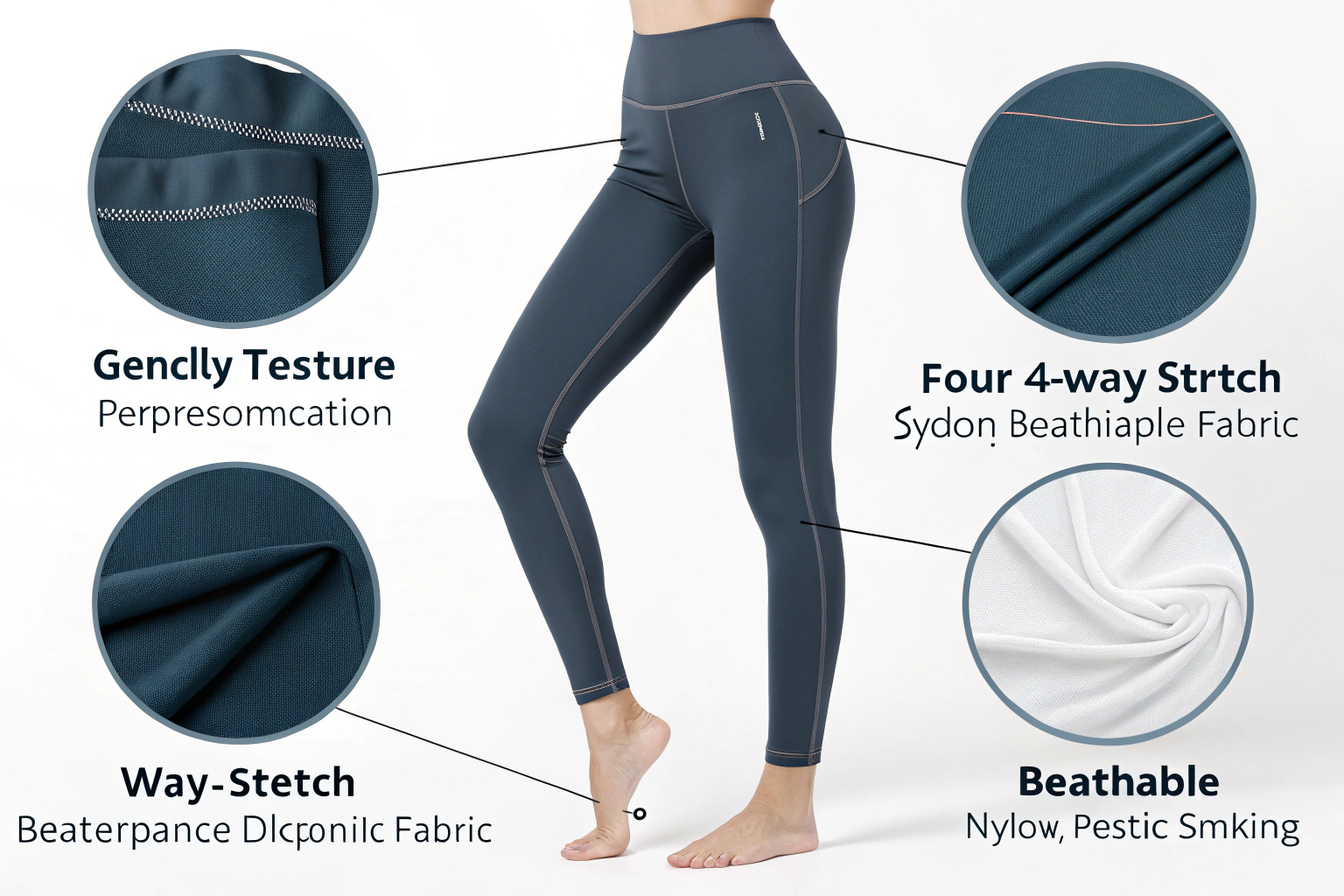
Yoga leggings aren’t just gym gear—they’re part of your daily wardrobe. Whether you’re in downward dog or grabbing groceries, the right pair makes you feel strong and supported. Here’s what separates the best leggings from the rest.
Why is fabric the most important feature in yoga leggings?
High-quality yoga leggings use fabrics that are breathable, moisture-wicking, stretchy, and durable, such as polyester-spandex or nylon blends.
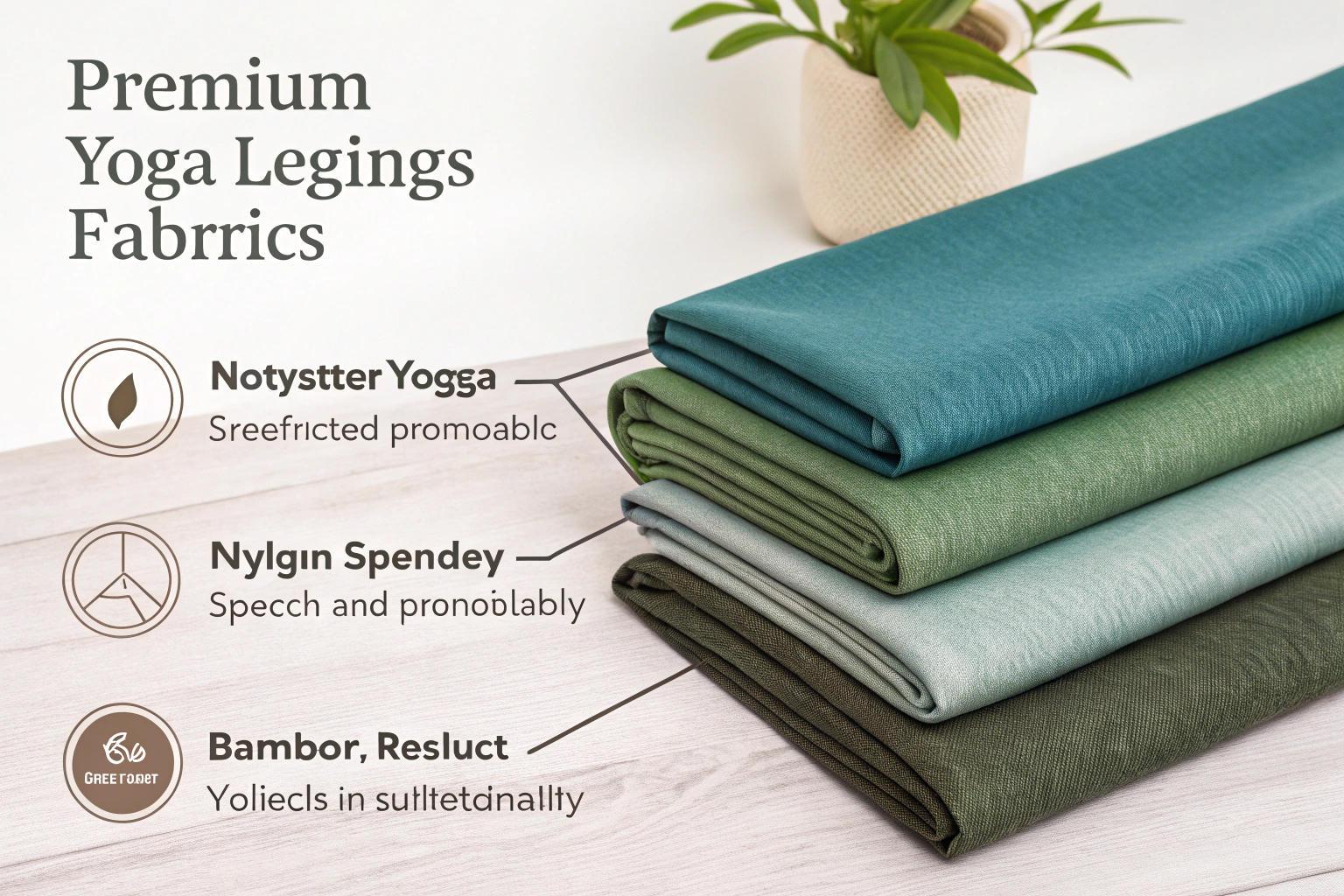
Yoga is about movement, breath, and focus. Cheap or poorly chosen fabric distracts from that. Great leggings often use a polyester-spandex blend or a nylon mix for stretch and support. Spandex adds elasticity, letting the leggings move with you instead of against you. Polyester helps with moisture control so you don’t stay sweaty. Eco-conscious brands also offer leggings with recycled fabrics or bamboo-based fibers for sustainability without sacrificing comfort. The feel of the fabric matters too—soft, non-abrasive textures make a difference in long sessions.
| Fabric Type | Benefits | Drawbacks |
|---|---|---|
| Polyester-Spandex | Lightweight, dries quickly, stretchy | Can pill if low quality |
| Nylon-Spandex | Stronger compression, smooth finish | Slightly warmer than poly |
| Bamboo-Blend | Soft, eco-friendly, breathable | May wear out faster |
How important is waistband design in yoga leggings?
A great pair of yoga leggings has a high, wide waistband that stays in place and provides core support without digging into your skin.
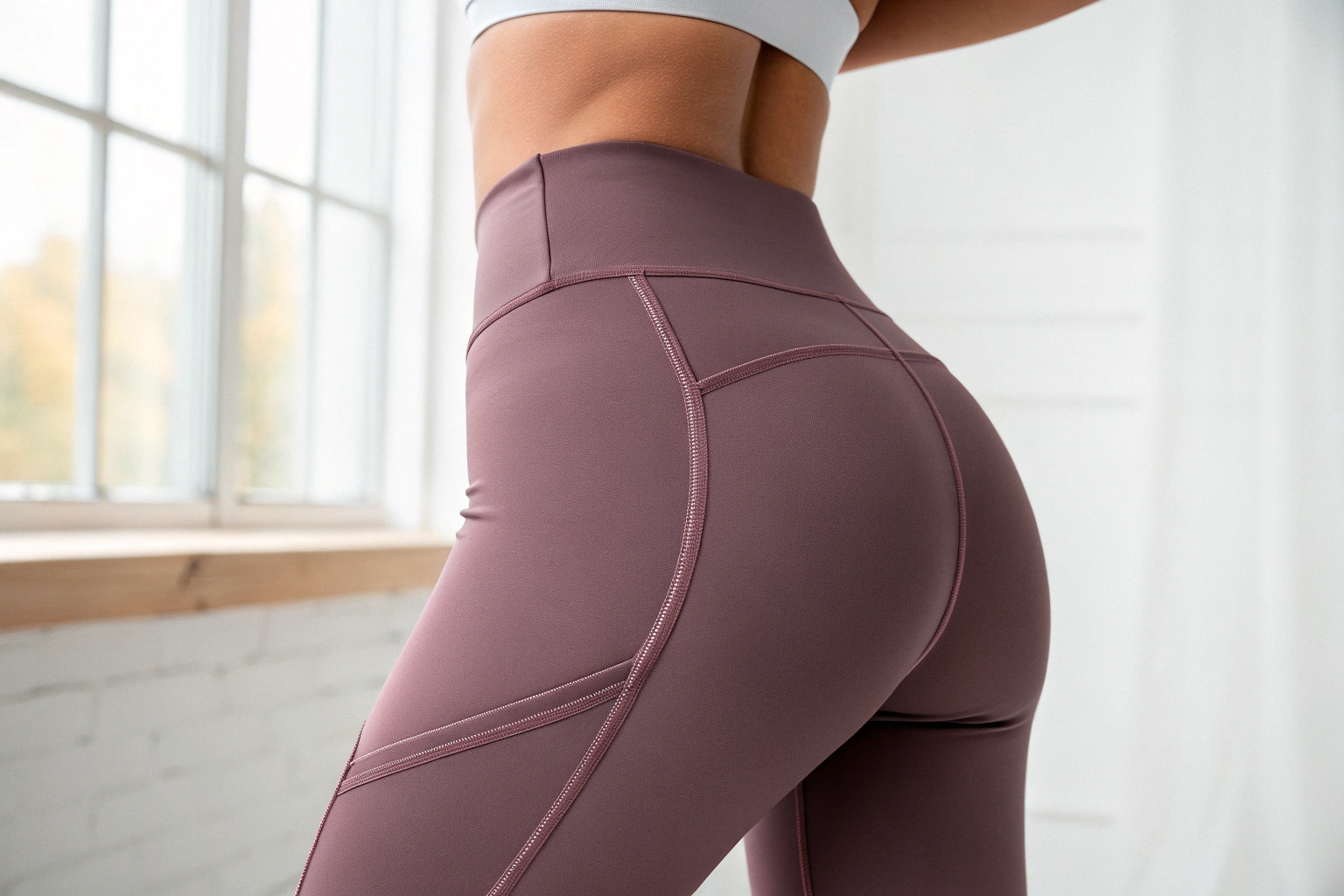
Leggings are useless if you’re constantly tugging them back up. A high-rise waistband that’s wide and firm gives support to your midsection and creates a flattering line. Some styles use double-layer waistbands for extra compression. Others include hidden pockets or sculpted V-shapes that enhance your figure. Avoid waistbands with thin elastic or minimal structure—they’re more likely to roll or pinch. A good waistband works like a built-in belt, keeping everything in place while allowing full range of motion.
| Waistband Feature | Why It Matters | What to Look For |
|---|---|---|
| High-Rise Fit | Prevents rolling, adds support | Sits above belly button |
| Wide Band | Distributes pressure evenly | At least 3 inches wide |
| No Elastic Cord | Reduces digging or bunching | Flat, bonded seam |
What role does fit and cut play in yoga leggings?
Yoga leggings should offer a second-skin fit with four-way stretch, contouring to your body without compressing too much or becoming see-through.
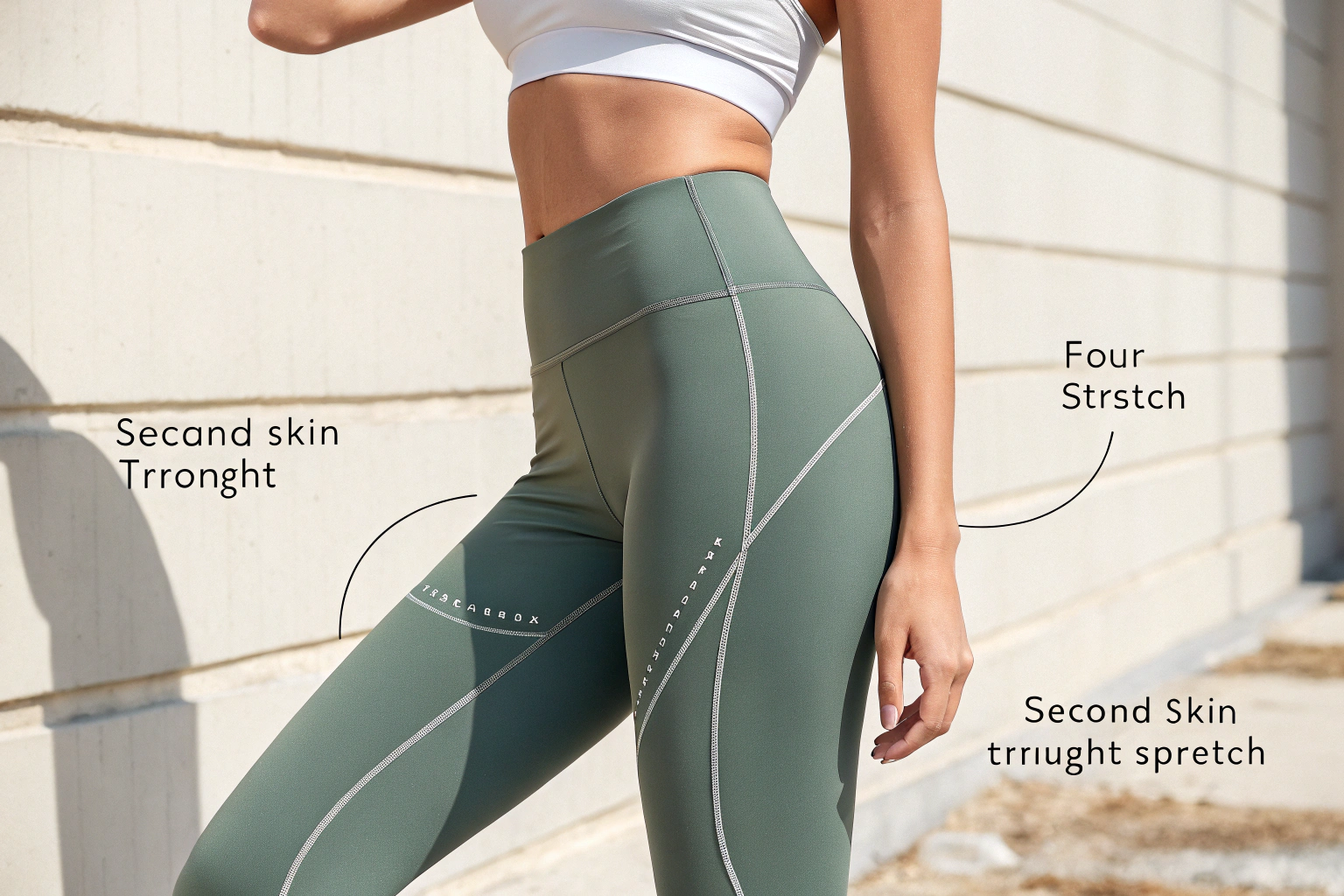
Fit is more than just size—it’s how the legging hugs your curves and supports your shape. Look for leggings that have enough compression to stay up but enough stretch to handle every pose. A gusseted crotch (diamond-shaped panel) helps with flexibility and prevents seam damage. Full-length leggings are great for coverage, while 7/8 or cropped styles work better for hot yoga or petite frames. Check if they’re squat-proof by testing in natural light. If you can see skin or your underwear, try a different pair.
| Fit Feature | Purpose | Recommended Use |
|---|---|---|
| Four-Way Stretch | Moves in all directions | Dynamic yoga practice |
| Gusseted Crotch | Prevents pulling and tearing | Deep stretch poses |
| Compression Panels | Shapes thighs and glutes | Sculpting effect, extra support |
How do yoga leggings support different body types?
Great yoga leggings come in inclusive sizing and designs that flatter different body shapes, from petite to plus-size, ensuring comfort and mobility.
Leggings should fit every body—not just certain sizes. That means offering extended sizes, but also adjusting rise, inseam, and stretch to match. For curvier bodies, a contoured waistband helps avoid gapping. For petite figures, 7/8 length or shorter inseams prevent bunching. Plus-size leggings need better stitching strength and reinforced panels. Brands that test on diverse models usually get it right. When leggings feel custom to your body type, your confidence during practice improves.
| Body Type | Fit Feature to Look For | Common Issue to Avoid |
|---|---|---|
| Curvy | Contoured waist, high compression | Waist gaping |
| Petite | 7/8 length, high rise | Leg bunching |
| Plus Size | Reinforced seams, sculpted shaping | Waist roll-down, seam breakage |
What kind of design details elevate yoga leggings?
Top-tier yoga leggings include subtle but smart design details like hidden pockets, sculpting seams, and color-blocking that blends form and function.
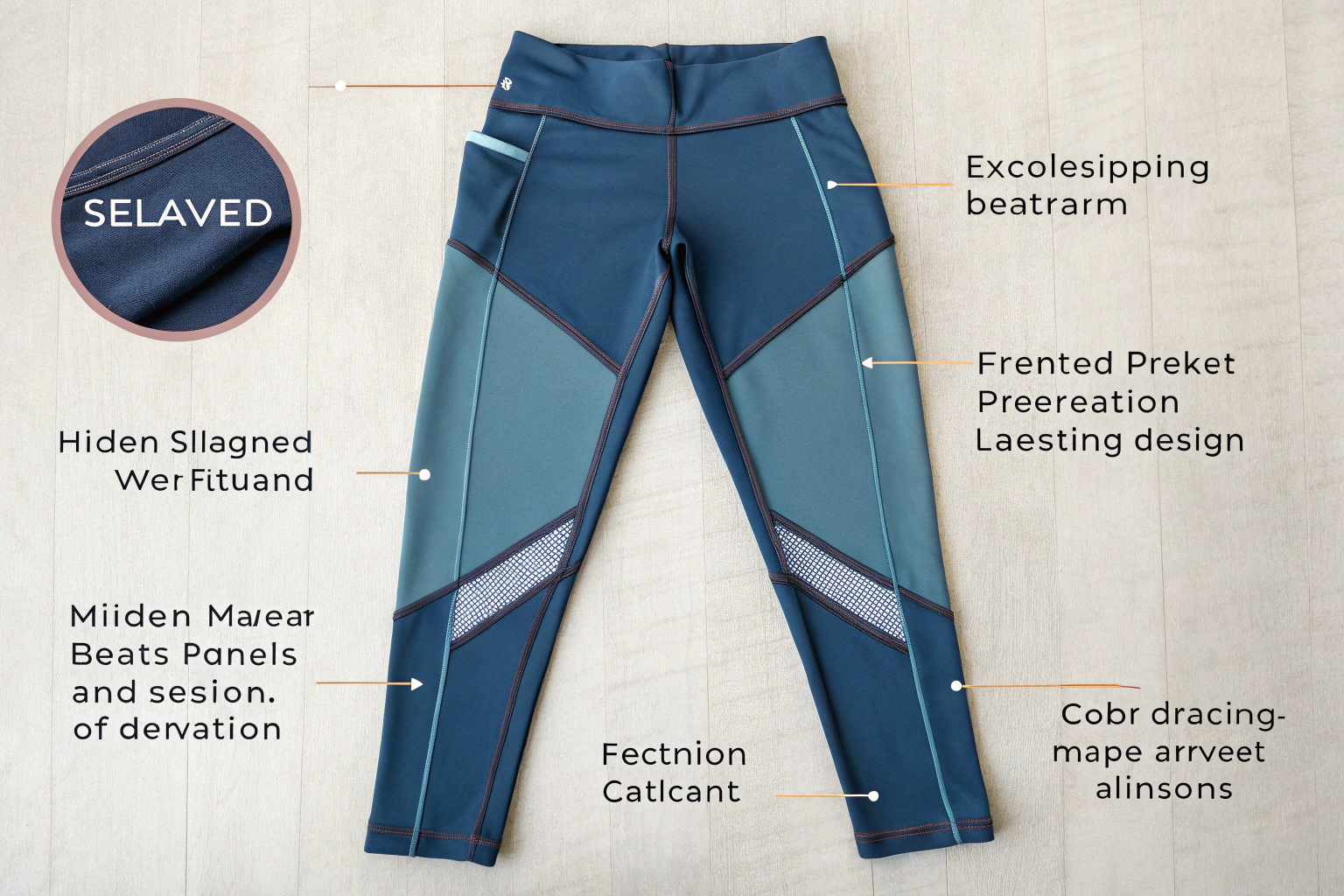
You want leggings that move well, but you also want to feel good wearing them. Thoughtful design details matter. Sculpting seams can visually lengthen your legs or enhance glute shape. Hidden waist pockets can carry cards or a key without bulk. Breathable mesh panels can add style while improving airflow. Strategic color blocking can help create a flattering look. These small elements make your leggings look and feel premium—something your customers notice, especially in fashion-conscious yoga communities.
| Design Detail | Benefit | Function |
|---|---|---|
| Hidden Waist Pocket | Secure storage without bulk | Ideal for minimal carry |
| Sculpted Seams | Flattering shape, extra durability | Style + function combo |
| Mesh Panels | Increased airflow, visual interest | Hot yoga sessions |
Do materials and manufacturing affect performance and sustainability?
What leggings are made of—and how they’re made—affects both performance and the planet.
Eco-friendly yoga leggings use recycled fabrics and certified dyes, with ethical production practices that meet the expectations of modern consumers.
Yoga culture increasingly values sustainability. That means customers ask questions: Is this recycled fabric? Are the workers treated fairly? Brands that use OEKO-TEX certified dyes or GRS-certified materials earn customer trust and avoid harmful chemicals. Recycled polyester and nylon reduce environmental impact while maintaining durability. Transparent sourcing also helps your brand connect deeper with eco-minded yogis. If your leggings perform well and reflect values, they become part of a lifestyle—not just a purchase.
| Sustainability Feature | Consumer Benefit | Industry Standard |
|---|---|---|
| Recycled Fabric | Reduces waste, same performance | GRS (Global Recycle Standard) |
| Certified Dyes | Skin-safe, no harmful chemicals | OEKO-TEX certification |
| Ethical Factories | Better working conditions | BSCI, WRAP certified |
Conclusion
A great pair of yoga leggings balances stretch, support, and style. It’s about more than fabric or fit—it’s about how you feel when you move. The best leggings stay in place, breathe with your body, and flatter every shape. They also reflect growing demands for sustainability and inclusivity. For both brands and consumers, quality yoga leggings aren’t a luxury—they’re essential gear that reflects performance and purpose.

